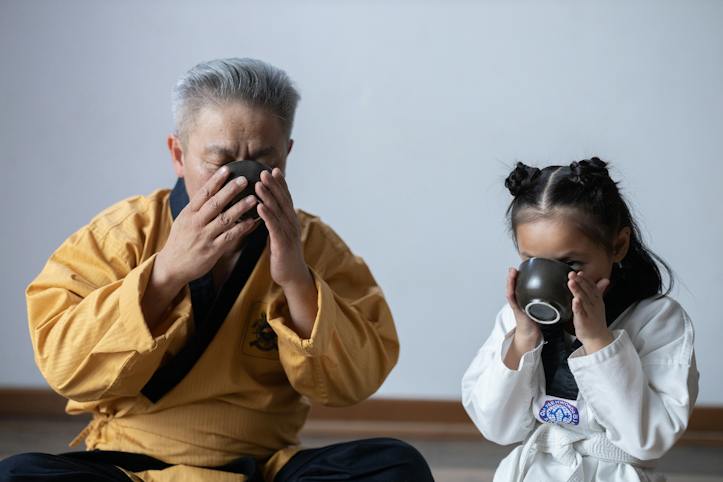Understanding How Drinking Tea Affects Fasting

When engaging in a fasting regimen, it’s crucial to know which beverages are permissible without breaking your fast. Among the various options, tea is often considered a go-to drink, but is drinking tea breaking a fast? This blog post will explore the impact of different types of tea on fasting and offer guidance for those looking to maintain their fast while enjoying a warm cup of this beloved beverage.
The Fundamentals of Fasting
Fasting involves abstaining from all or some kinds of food or drink for a set period of time. It’s a practice that dates back millennia and is used for various reasons, including religious rituals, detoxification, and weight loss efforts. The primary goal during a fasting period is to enter a state of ketosis, where the body begins to burn fat for fuel in the absence of glucose.
Does Drinking Tea Constitute Breaking a Fast?
The answer to whether tea can disrupt a fast is not straightforward and depends largely on the type of tea and its preparation. Pure, unsweetened teas without any added ingredients typically do not contain calories, making them an excellent choice for those who are fasting. However, adding sweeteners, milk, or cream can introduce calories and potentially interfere with the fasting process.
Types of Tea and Their Impact on Fasting
Let’s look at various types of tea and assess their compatibility with fasting:
Black Tea and Fasting
Black tea, made from the leaves of the Camellia sinensis plant, is rich in antioxidants and has zero calories when consumed plain. As such, drinking black tea without additives should not break a fast.
Green Tea: A Fasting-Friendly Option?
Similarly, green tea is another calorie-free option that can be enjoyed during fasting. It’s known for its health benefits, including enhancing metabolism, which could be beneficial for those fasting for weight loss purposes.
Herbal Teas: Are They Safe During Fasting?
Herbal teas, which are infusions of herbs, spices, or flowers, are also generally considered safe during a fast as long as they’re consumed without caloric sweeteners or dairy.
Considerations When Including Tea in Your Fast
While tea in its purest form is generally acceptable during fasting, it’s essential to monitor your body’s response. Certain herbal teas may stimulate appetite or have a laxative effect, which could be counterproductive or uncomfortable during a fast.
Caloric Content: The Key Factor
The most critical aspect to consider is the caloric content of the tea. To maintain a true fast, your beverage should not provide a significant amount of calories, as this could take your body out of the fasting state.
Caffeine Considerations
Teas that contain caffeine, such as black and green teas, can suppress appetite, which may help some individuals extend their fasting periods. However, caffeine sensitivity varies, and some people might experience jitters or disrupted sleep, which could make fasting more challenging.
In summary, the act of drinking tea in its pure, unsweetened form does not break a fast. It can even offer benefits such as appetite suppression and increased metabolism. However, it’s fundamental to avoid teas with added sugars or caloric ingredients and to pay attention to how your body reacts to different types of teas during your fast.
For those practicing fasting for health, spiritual, or dietary reasons, incorporating the right kind of tea can be a comforting and beneficial addition to your routine.
Discover if drinking tea can break a fast and learn about the types of tea that are fasting-friendly in this detailed guide.
Recent Posts
- Understanding the Discontinuation of White Yogi Healthy Fasting Tea
- Fasting Tea Benefits: What Happened to White Yogi Healthy Tea?
- Fasting Tea Benefits: What Happened to White Yogi Healthy Brand?
- Fasting Tea Benefits: Before White Yogi Tea’s Discontinuation
- Fasting Tea Benefits: What Happens When Discontinued?
- Fasting Tea Benefits: Exploring Alternatives to White Yogi Healthy Fasting Tea
- Understanding the Discontinuation of White Yogi Healthy Fasting Tea
- Fasting Tea Benefits: What Happened to White Yogi Healthy Blend?
- Fasting Tea Benefits: A White Yogi’s Perspective
- Fasting Tea: Understanding the Discontinuation of White Yogi Healthy Blend
External articles
In fact, health experts have identified types of tea that do not break a fast. This gives you a variety of teas to choose from that not only help curb cravings, but also add comfort, health benefits, and flavor to your fast. "Tea is a perfect addition to your fasting experience." TEA CROSSING
Generally, drinking tea won't break a fast. It's the ingredients you might to add to your tea that could end up breaking your fast.
5 Teas That Don't Break a Fast Can Drinking Tea While Intermittent Fasting Promote Weight Loss? Take-Home Messages Intermittent fasting has garnered much attention in recent years. The appeal of this regimen is based on the fact that you are supposed to limit when you eat, not what you eat.
